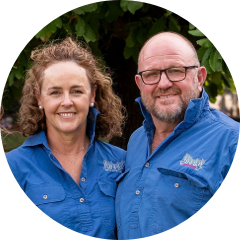Quantifying the carbon gains from mixed cropping systems
This project was completed in 2020.
WHY THIS PROJECT WAS IMPORTANT
In north-east Victoria and southern NSW, two soil properties influence soil health and productivity in a significant way – soil pH and soil organic carbon (SOC).
Soil pH plays an important role in governing the chemical environment in the soil, while soil organic carbon (SOC) is a key component of soil organic matter (SOM) and plays many important roles in maintaining soil health.
This project aimed to quantify the baseline variance in soil pH and soil organic carbon (SOC) in four cropping paddocks and four pasture paddocks in north east Victoria, to understand the degree to which these parameters may vary in paddocks that appear relatively uniform.
Project focus
Soil organic carbon also contributes much to our soil and farming systems and mechanisms are now in place, through the Federal Government Emission Reduction Fund, to pay farmers to maintain an increase in SOC, via the Carbon Farming Initiative. This project sought to provide further information for growers looking to understand more about this process using the methods and pricing available to farmers at the time (2021).
Because the calculation of carbon stocks is more difficult in practice than in theory, and because there was a lack of regionally relevant reference data available for growers, the collection of soil samples using protocols from the Carbon Farming Initiative aimed to provide a regionally relevant example of how to conduct this work, as well as a guide to likely local SOC stocks.
The project also aimed to calculate the benefit that could be ascribed to an SOC increase of 0.5% (within a 25-year contracted period), using data collected for one of the project paddocks.
The project team thanks participating growers for their willingness to contribute to this work.
Project outcomes
Report on pH and soil organic carbon improves local understanding of carbon farming (April 2021)
With many local farmers interested in the potential for carbon farming, Riverine Plains completed a region-first project looking into the viability and practicality of increasing soil carbon for trading through the Australian Government’s Emission Reduction Fund during 2021.
“To participate in carbon farming, farmers need to show an increase in soil carbon stocks over time, however this is easier said than done, with farmers facing a range of challenges in demonstrating the required levels of change” explained former Riverine Plains Project Officer and project leader, Dr Cassandra Schefe (now principal of AgriSci).
“With the support of the Cool Soil Initiative, Riverine Plains established a project in which paddocks were sampled to determine baseline soil pH and soil organic carbon using the specific methods set out in the Carbon Farming Initiative” said Dr Schefe.
“From this, we were then able to calculate stocks of soil organic carbon for each paddock and also used a particular paddock to work out what a 0.5% increase in soil carbon might look like in terms of the Australian Carbon Credit Unit, which can then be traded via the Emission Reduction Fund” she added.
The calculations, based on a pasture paddock near Springhurst, showed the potential financial gains from carbon farming to be relatively modest, with the returns needing to be weighed against the sampling, auditing and reporting costs of participating in the Emission Reduction Fund, as well as the long-term nature of the contract.
“The project highlighted how complex it can be to measure and validate any increase or change in soil organic carbon over time, and that trading carbon through the Emission Reduction Fund requires a thorough understanding of the process before committing” Dr Schefe said.
Aside from carbon farming, one of the most important take-home messages from the project was that soil pH and soil organic carbon influence soil health in a significant way, and it is important to measure changes through regular soil testing.
“While interactions between soil pH and soil organic carbon are complex, soil pH is a key parameter driving the soil’s ability to increase soil carbon, with low pH soils having reduced microbial activity and organic matter turnover.
“We know that soil pH, in both the top-soil and the subsoil, is limiting productivity in a number of soils across north-east Victoria and southern NSW, and recommend that farmers use incremental soil sampling as a tool to help identify soils that require lime or other interventions” Dr Schefe concluded.
Further reading
- The final report for this project was published in Research for the Riverine Plains, 2021
Find out more
For further information on this project, please email Riverine Plains Senior Project Manager Jane McInnes at jane@riverineplains.org.au
Project investment
This project was completed within the Cool Soil Initiative with partners Mars Petcare, Kellogg’s, Manildra Group and Allied Pinnacle, through the Sustainable Food Lab and Charles Sturt University (CSU), with additional funding through the Food Agility Cooperative Research Centre (CRC) and participating growers.
This project was also supported by the North East Catchment Management Authority and Goulburn Broken Catchment Management Authority through funding provided by the Australian Government’s National Landcare Program.
Focus areas
MORE ON Soils & Sustainability
Our research enhances food production, increases environmental resilience and improves community connection across the Riverine Plains. See how our research creates impact.
-
Grains
Sustainability
-
Business
Sustainability
-
Livestock
Sustainability
-
Grains
Sustainability
-
Soils
Sustainability
-
Soils
Sustainability
-
Grains
Sustainability
-
Sustainability
Drought
-
Sustainability
-
Grains
Sustainability
-
Soils
Grains
-
Soils
Sustainability
-
Grains
Soils
-
Soils
Grains
-
Grains
Soils
-
Soils
Grains
-
Soils
Sustainability
-
Grains
Soils
-
Sustainability
Grains
-
Grains
Sustainability
-
Soils
Grains
-
Soils
Climate
-
Grains
Sustainability
-
Soils
Climate
-
Grains
Soils
-
Sustainability
Grains
JOIN RIVERINE PLAINS
Riverine Plains provides opportunities to see new research and innovation, connect with rural communities, and attend informative events.


